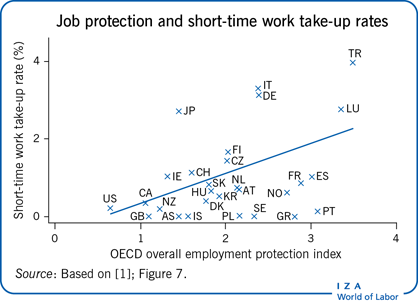Elevator pitch
Government schemes that compensate workers for the loss of income while they are on short hours (known as short-time work compensation schemes) make it easier for employers to temporarily reduce hours worked so that labor is better matched to output requirements. Because the employers do not lay off these staff, the schemes help to maintain permanent employment levels during recessions. However, they can create inefficiency in the labor market, and might limit labor market access for freelancers and those looking to work part-time.
Key findings
Pros
Short-time work compensations reduce layoffs and make it easier for employers to adjust their workers’ hours to meet work requirements.
Because fewer people lose their jobs, both the employer and the state pay less in unemployment benefits.
Used in downturn periods, compensation schemes are particularly beneficial for permanent workers, who can continue in steady employment.
Short-time work compensation schemes benefit companies, because they allow them to retain valuable staff during downturns.
Cons
Compensation schemes are not beneficial to temporary workers, who do not qualify for payments and may be excluded from the labor market.
By distorting the labor market, short-time work compensation schemes can lead to inefficiency; reductions in working hours negotiated may not match the demand for labor.
Because jobs are retained when there is no demand, the schemes inefficiently reduce the reallocation of labor to more productive jobs.
Compensation schemes are not necessarily the most effective way of adjusting hours and labor costs during a recession; company-level bargaining over hours, wages, and employment may provide a better-tailored outcome than a state-sponsored scheme.
